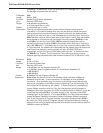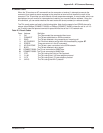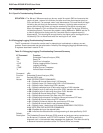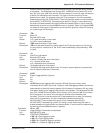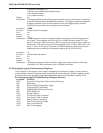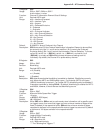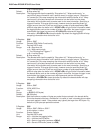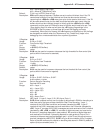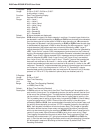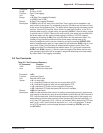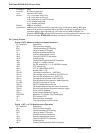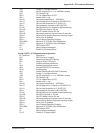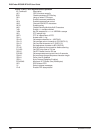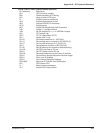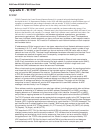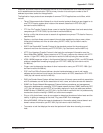
RASFinder RF300E/RF310E User Guide
RF300E/RF310E156
S-Register: S103
Usage: S103=n; S103?; S103.b=n; S103.?
b=bit number, n=value
Function: Real-Time Decoding Display
Unit: Decimal ASCII code
Range: bit 0—Layer 1
bit 1—Layer 2
bit 2—Layer 3 short
bit 3—Layer 3 long
bit 4—Raw B1
bit 5—Raw B2
bit 6—Decode B1
bit 7—Decode B2
Default: 0 (None decoded and displayed)
Description: S103 selects the type(s) of data to decode in real-time. If a certain type of data is to
be decoded in real-time according to S103 and S102 allows that data to be decoded,
then that data type will not be stored in RAM for later decoding via >Dn commands.
Data types not decoded in real-time according to S103 yet S102 allows the data type
to be decoded will be stored in RAM for later decoding via >Dn commands. “Layer 1”
outputs decoded I.430 state transitions and events (decoded by >D8). “Layer 2”
outputs decoded Q.921 information sent and received on the D-channel (decoded by
>D2). “Layer 3 short” outputs Q.931 messages sent and received on the D-channel,
but only the message-type and not the Information Elements is decoded (decoded by
>D39). “Layer 3 long” outputs decoded Q.931 messages sent and received on the D-
channel (decoded by >D3). If both “Layer 3 short” and “Layer 3 long” are enabled,
then “Layer 3 long” will override “Layer 3 short.” “Raw B1” outputs raw hexadecimal
data sent and received on B-channel 1—similar to the >D7 command. “Raw B2”
outputs raw hexadecimal data sent and received on B-channel 2—similar to the >D7
command. “Decode B1” outputs decoded data protocol information sent and received
on B-channel 1 only if the data protocol is V.120 or X.75. “Decode B2” outputs
decoded data protocol information sent and received on B-channel 2 only if the data
protocol is V.120 or X.75. By default all options (bits) are disabled (set to 0).
S-Register: S104
Usage: S104=n; S104?
Function: Real-Time Decoding
Unit: 10ms
Range: n=0 (Real-Time Decoding Disabled),
n=1-255 (10ms-2.55s)
Default: 0 (Real-Time Decoding Disabled)
Description: If S104 is set to a non-zero value, then Real-Time Decoding will be enabled on the
port to which it was given. For autobauding devices, the serial rate will then be fixed
at the rate of the command given. The delay before displaying decoded information
can be set from 10ms to 2.55 seconds. When there is a great deal of activity in the
TA it is probably best to set for a higher delay, but generally S104=1 (10ms of delay)
is good at a serial rate of 115200. If there is too much activity in the data types
allowed by S102 and S103, then some decoded information will be thrown away until
the activity allows decoding to continue. If DTR is negated (judged by the setting of
&Dn), then decoded information will also be thrown away. The number of decoded
information buffers that are thrown away are kept track of by wNumTracesDenied,
which can be viewed by giving the command ATS96?<CR>. wNumTracesDenied is
reset to 0 upon power-up and whenever S104 is set to a non-zero value. If Real-
Time Logging is enabled and the ports to which Real-Time Logging and Real-Time
Decoding are enabled match (I.E. giving both commands S104=1 and S105=1 to
port 1), then the real-time logging information and the real-time decoding information
will be merged in sequence according to the time-stamp. By default Real-Time
Decoding is disabled.



